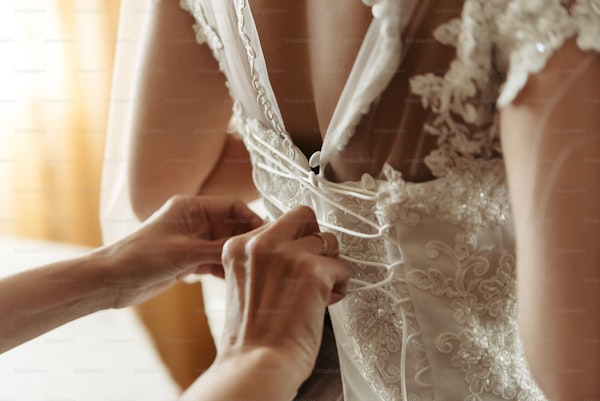How to Ensure Your Wedding Dress Fits Perfectly: A Comprehensive Guide
How to Ensure Your Wedding Dress Fits Perfectly: A Comprehensive Guide
Your Wedding Day: The Importance of a Perfectly Fitting Dress
Choosing the right wedding dress is one of the most exciting moments in a bride's journey to matrimony. However, ensuring that your wedding dress fits properly is crucial for comfort, confidence, and overall aesthetic on your special day. This article delves into the steps and considerations necessary for achieving the ideal fit for your wedding dress.
Understanding the Fit: Why It Matters
A well-fitting wedding dress not only enhances your silhouette but also allows you to move freely. Ill-fitting dresses can lead to discomfort and can take away from the joyous experience of your wedding day. As you embark on this important journey, keep in mind that looking stunning also means feeling comfortable. Here are several factors to consider:
- Comfort: You will wear your dress for hours, and it should allow for comfortable movement.
- Style: Different styles may fit differently; knowing your preferred silhouette can guide you.
- Alterations: Most dresses require some level of alteration for a tailored fit.
Steps to Ensure a Perfect Fit
Here are some essential steps to make sure your wedding dress fits properly:
1. Start with the Right Size
Wedding dress sizes differ from everyday clothing sizes. A bridal gown can fit anywhere from a size 0 to a size 30. It’s advisable to go by the measurements rather than the number. Begin by taking accurate measurements of your bust, waist, and hips. Most bridal salons provide measurement services, which can be very helpful.

2. Choose Your Dress Wisely
Consider your body type. A-line cuts are flattering for most figures, while mermaid silhouettes may suit hourglass shapes. Look for designs that reflect your personal style, and keep in mind the venue and the season of your wedding. When you have several options, trying on different styles can help clarify what fits and feels best.
3. Schedule Regular Fittings
Plan for multiple fittings as your wedding day approaches. Wearing undergarments similar to what you’ll wear on the event day is essential, as it alters the look and fit of the dress. It’s typically advised to schedule fittings as follows:
| Fitting Schedule | Frequency | Purpose |
| Initial Fitting | 1-2 months prior | Assess overall fit and style |
| Second Fitting | 2-3 weeks prior | Make minor adjustments |
| Final Fitting | 1 week prior | Final adjustments and checks |
4. Communication with Your Tailor
Open communication with your dressmaker is vital. Make sure to express any concerns or desires regarding the fit. Your tailor can help you understand the limitations and possibilities for adjustments. Always listen to their expertise, as they'll guide you on what can realistically be adjusted to ensure the best fit.
5. Consider Fabric and Structure
The type of fabric impacts how a dress fits. Some fabrics like satin may cling more to the body, while others like chiffon might flow without restriction. Understanding the fabric will help you make informed decisions on fit. Ensure that the structure of the dress supports your shape well. Heavier fabrics may offer more support than lighter ones.
6. Pay Attention to Details
Check if the dress allows for movement around your arms, back, and waist. If the dress has a corset back, ensure that it is properly laced to give you an appropriate fit. When you can move freely, it will enhance your comfort during ceremonies and receptions.
Trial Run: Dress Rehearsals
Consider a dress rehearsal before your big day. Wear your wedding dress for a few hours during a bridal shoot or a family event. This will give you a more realistic understanding of comfort and fit and allow your tailor to make last-minute adjustments if necessary.
Accessories Matter
When fitting your dress, remember to bring the accessories you'll wear on your wedding day, such as shoes, veils, or any other adornments. These pieces can affect the overall fit and look of your dress, especially if they add height or change your body posture.
Post-Fitting: What to Do If It Doesn’t Fit
If your dress doesn’t fit perfectly even after multiple fittings, don’t panic. There are options available, such as:
- Alterations: Most dresses can be adjusted with the right skills. Tailors can let out seams, take in darts, or shorten hems as needed.
- Build a Support System: Enlist a friend or family member to provide input from the outside perspective.
- Backup Options: Consider having a backup dress that fits you perfectly, just in case.
Final Thoughts: Making Your Dream Dress a Reality
Making sure your wedding dress fits properly is essential to your comfort and enjoyment on one of the most important days of your life. From selecting the right size to planning fittings and communicating with your tailor, careful attention to detail will create a seamless experience.
Your wedding dress is a representation of your unique style and personality; therefore, investing time in ensuring its perfect fit will enhance not just your appearance but also your confidence as you walk down the aisle.
Remember, it’s not just about the dress; it’s about the joy of the journey, so enjoy each moment leading up to your wedding day and make it as beautiful as your dress!
